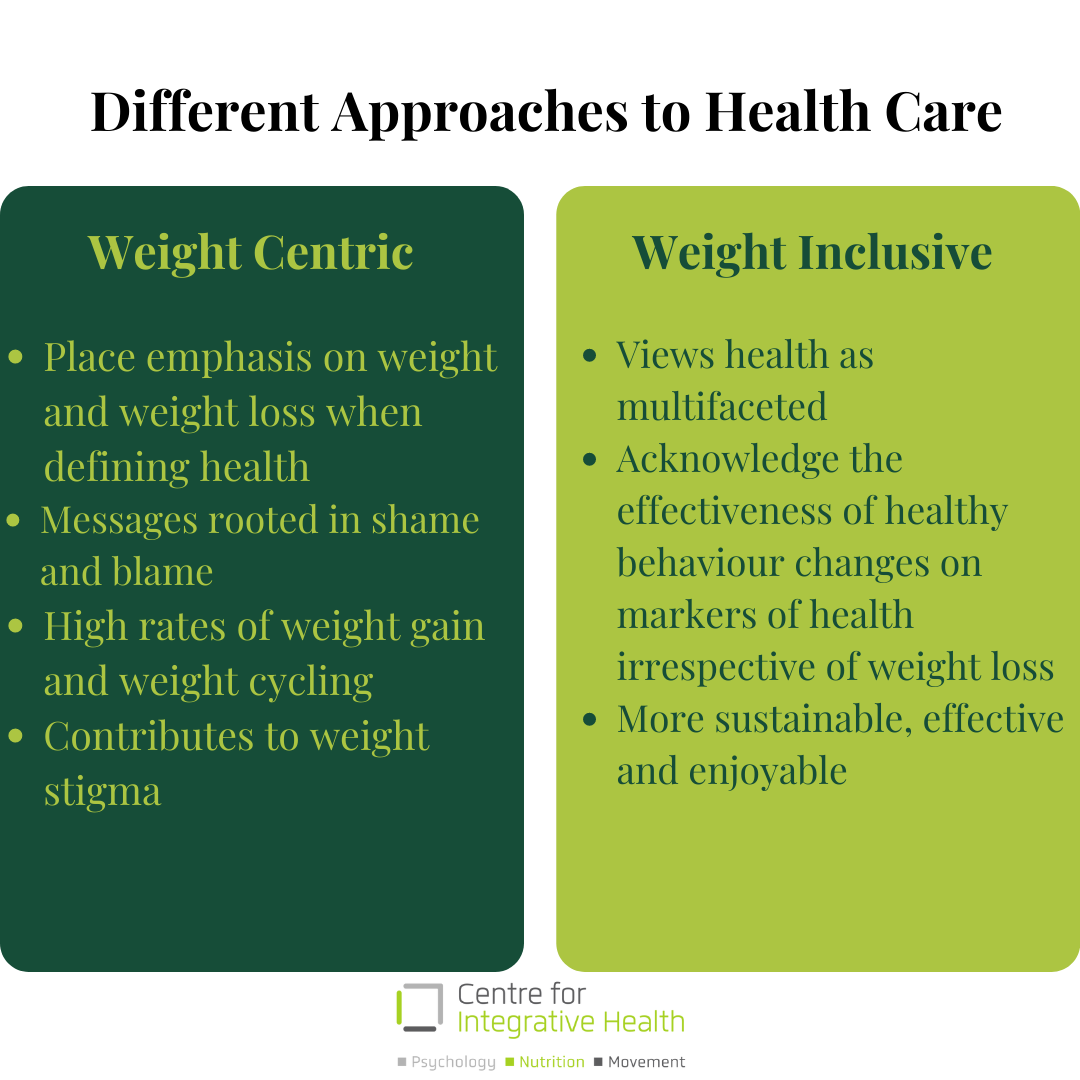“If I could start over, I’d have learned to let my body lead more. I’d have learned to partner with it rather than seeing its signals as inconveniences to overcome.”
I would like to talk about using an approach that goes against our human behavior and psychology. Humor me. I come from 15-plus years of being a Dietitian, seeing people try to lose weight in addition to studying science, AND learning from my own lived experience. You may want to hear this. I want, like you, your suffering to be reduced. Be aware of those fad diets this year. Read this before jumping into yet another one.

Attacking weight loss with weight focus can really backfire. Why?
- Extrinsic versus intrinsic motivators. Focusing on extrinsic motivation and behaviors doesn’t last very long. It’s an issue to have this dominant focus because extrinsic motivators are prey to the outside elements that we don’t have control over and are untrustworthy. Such as, exercising to win a race. Once the race is over you stop the exercise program. That thing, the extrinsic motivator, is over. Now the behavior you worked so hard on has no more drive attached to it. So you stop.You may be wondering how often you should weigh yourself then. Only as often as it doesn’t become the dominant feature of health behaviors, AND if you don’t have an Eating Disorder or disordered eating and body image suffrage. You don’t even have to see your weight at the doctor’s – you can do a blind weight check, or refuse.
- Weight numbers are arbitrary and fluctuate. What is weight?In a fit female, bones make up 12% of the total body weight, muscles about 30 to 35%, and fat around 27%.In muscular males, bones make up 15% of the total body weight, muscles about 40 to 45%, and fat about 15%.
For both sexes, the remainder of the weight is a result of other matter including skin, connective tissues, tendons, ligaments, blood plasma, organs, hairs and its related glands, etc.
Interestingly there is one chemical that contributes up to 70% of your body weight…you guessed it – it’s water H2O. Your muscles are about 75% water, 20% of it is proteins, and the rest 5% are minerals and other things. Your bones and even fat are 50% water!My point here is there are many components to weight. So if you are hanging your hat on weight numbers only and making it the highest value, you will be disappointed, misled, and you may give up on your health behaviors.
- Disconnection from your body cues. If you are just looking at that scale number or BMI and not actually connecting to those beautiful and built-in self-regulatory symptoms your body is telling you, your game plan will not last. There will be NO sustainable healthy-behavior change. Sorry. It’s science.Here’s an example: How do you feel when you eat a big giant salad filled with avocado, beans, and fruits? I bet you feel energetic and productive and light. Regular bowel movements, fighting illness, and sleeping better, just to name a few of the symptoms you may feel from that healthy choice.In opposition, how do you feel when you eat a giant burger with cheese and a soda? Very full, lethargic, not pooping easily, inflamed, sleep is interrupted, not fighting illness, just to name a few of the symptoms.Your body is a beautiful machine and will give you signs of wellness if you pay attention and deeply practice tuning in. THIS is intrinsic motivation. This is what lasts a lifetime. Do you want that?

Taking a weight-neutral approach involves working outside the confines of weight loss or the pursuit of thinness as the main goal. I know you probably want sustainable weight loss. But, the primary goal is to respect the body and learn how to cultivate healthy habits. Unlike traditional approaches to weight loss, weight is not used as an indicator of health. We should also be aware that this approach can be quite harmful to many individuals. It can contribute to food and body preoccupation, disordered eating and workout habits, and repeated cycles of weight loss and regain. Also, taking a weight-loss approach can create stigmatizing and discriminatory practices toward larger bodies. All health practitioners should not be focusing predominantly on weight. If your doctor does, educate them and switch.
Research shows that the current weight-focused paradigm does not produce leaner or healthier bodies. Studies show that most of the time, long-term intentional weight loss is not successful. So why are we supporting something that has such a low success rate? Why not choose a weight-inclusive approach and suffer less?
Fortunately, there is a considerable amount of research related to adopting a weight-neutral approach. Not only does this approach potentially reduce the harms that are sometimes associated with a weight-focused approach to health, but it may also create more long-term success and improved health outcomes.
This is supported by studies and experience. Not convinced? Reflect on your own weight loss journey and see for yourself.

Some other health indicators we can measure BESIDES weight/BMI:
- How often and how severely you are getting sick
- Your energy levels in a day. What’s your energy level when you wake up in the morning? Rate yourself from 1-10.
- Your mood. Is it more stable and positive, or erratic and negative?
- Your sleep. Is it quality and enough sleep?
- Mobility, strength, and endurance. The 3 pillars of being physically fit. Can you move with ease and without a ton of joint pain and perform all your daily living activities without being winded or feeling weak?
- Confidence and empowerment. Do you feel like you can take on the world?
- What other indicators mean something to you??
Wishing you overall wellness, not just “proper” weight.
Miriam Jirari MPH, RDN, CPT, Intuitive Eating Counselor
Studio SWEAT Dietitian

Resources:
- https://www.acefitness.org/resources/pros/expert-articles/7992/increase-your-impact-by-taking-a-weight-neutral-approach/#:~:text=Taking%20a%20weight%2Dneutral%20approach%20involves%20working%20outside%20the%20confines,as%20an%20indicator%20of%20health.
- https://pubmed.ncbi.nlm.nih.gov/27289009/
- https://foodandnutrition.org/may-june-2017/understanding-weight-neutrality/
- https://academic.oup.com/nutritionreviews/article/78/1/39/5545181
- https://www.amdietetics.com/articles/the-non-diet-approach-the-weight-neutral-approach-to-dietary-management










Comments - 0